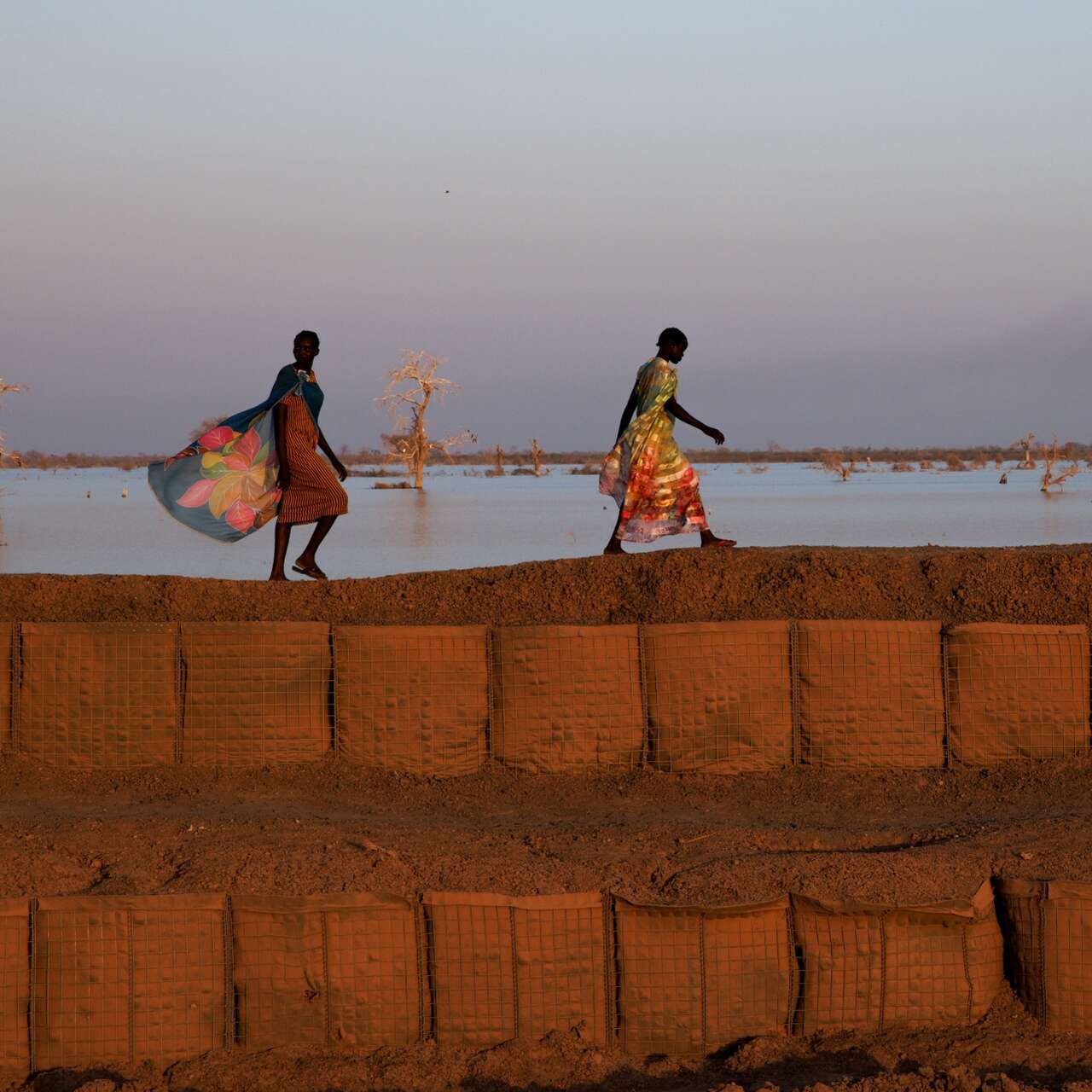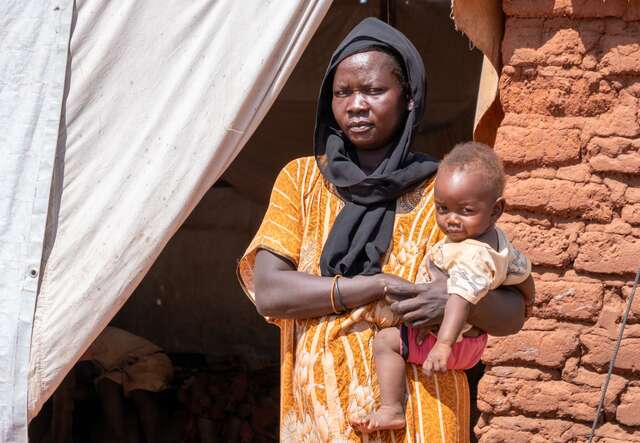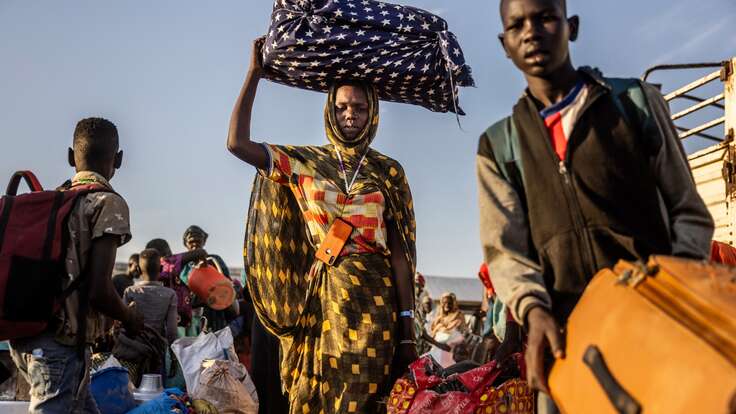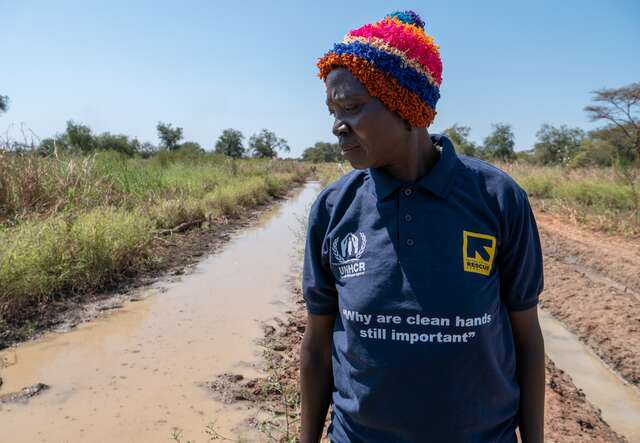
What’s happening in South Sudan? 10 million people need help
As the risk of conflict, climate shocks and famine grows in 2026, the IRC is supporting South Sudan.

As the risk of conflict, climate shocks and famine grows in 2026, the IRC is supporting South Sudan.
South Sudan is the world’s youngest country, gaining independence in 2011. However, hopes for stability were quickly undermined: a brutal civil war from 2013 to 2018 killed hundreds of thousands of people, displaced millions and devastated the economy.
Today, South Sudan is once again at a dangerous crossroads. Political tensions are rising, violence continues in parts of the country and repeated climate shocks—including years of severe flooding—have destroyed crops and livelihoods. At the same time, economic collapse has sent food prices soaring, leaving many families unable to afford even basic meals.
As a result, 10 million people—84% of the country’s population—urgently need humanitarian support. Projections show that nearly half of South Sudan’s counties will face emergency levels of food insecurity, at which point death by starvation is a daily risk.
These overlapping crises have landed South Sudan on the International Rescue Committee’s (IRC) 2026 Emergency Watchlist, which identifies countries most at risk of a deteriorating humanitarian emergency. South Sudan ranks third globally—behind only Sudan and the Occupied Palestinian Territory (oPt).
The Watchlist not only highlights the drivers of crisis, but also where urgent action can save lives. The IRC is on the ground in South Sudan, delivering health care, protection, education and economic recovery support to communities affected by conflict, displacement and hunger.
South Sudan is facing a severe humanitarian crisis driven by conflict, hunger, climate shocks and economic collapse. Years of violence and political instability have disrupted farming, markets and essential services. At the same time, repeated flooding, rising food prices and the arrival of refugees fleeing a brutal civil war in neighboring Sudan have left millions of people unable to meet their basic needs.
Together, these pressures are fueling widespread food insecurity and increasing the risk of famine in parts of the country.
The risk of famine in South Sudan is growing as families struggle to afford enough food to survive. Five consecutive years of economic decline, culminating in the economy shrinking by 30% in 2025 alone, have made it difficult for nearly all families to afford enough nutritious food. The cost of essential food supplies has quadrupled, leaving millions of people—including Sudanese refugees—unable to feed themselves.
Rising insecurity is making the situation even worse. Violence and access constraints regularly disrupt aid delivery, suspending food assistance and forcing the evacuation of humanitarian staff. Some households are already projected to face famine conditions, at which point death by starvation is a daily possibility.
“South Sudan is at a breaking point,” says IRC South Sudan Country Director Richard Orengo. “Women and children are bearing the brunt of this crisis. We are seeing alarming levels of acute malnutrition across the country, driven by conflict, unreliable climatic conditions, rising prices and repeated interruptions to aid.”

South Sudan’s fragile peace is under serious threat. A 2018 peace agreement ended a five-year civil war that killed nearly 400,000 people and forced millions from their homes. However, many of the deal’s key commitments—including security reforms and preparations for national elections—were never fully implemented.
With elections delayed and an economic crisis deepening tensions, the risk of renewed conflict is growing. For civilians, a return to widespread fighting would likely mean new displacement, further disruption to food production and dangerous interruptions to humanitarian aid—pushing already vulnerable families closer to famine.
The civil war in neighboring Sudan is compounding South Sudan’s crisis. It has created the largest humanitarian crisis in recorded history, pushing 15.8 million people into humanitarian need as civilians bear the brunt of the violence.
More than one million refugees and returnees have crossed from Sudan to South Sudan, often with little more than they can carry. These new arrivals urgently need food, shelter, health care and protection. At the same time, the communities hosting them—many already struggling to feed their own families—are under immense strain. Substantial international support is needed to deliver the required humanitarian aid.
The war has also created severe economic consequences for South Sudan. The country depends on oil exports that pass through Sudan, and damage to the oil pipeline in 2024 caused daily losses of $7 million, driving up prices of all goods for South Sudanese families.

Climate shocks continue to deepen South Sudan’s humanitarian crisis. The country suffered its sixth consecutive year of severe flooding in 2025, affecting over 900,000 people.
Flooding has also fueled a growing public health emergency. Contaminated water sources and overcrowded displacement sites have contributed to South Sudan’s longest-running cholera outbreak of over 100,000 cases. These shocks also come with significant economic impacts for the 95% of the population that depends on agriculture and pastoralism.

For over three decades, the IRC has stood as a lifeline for communities across South Sudan, responding to the urgent needs of those affected by conflict, displacement and disaster. As one of the country’s largest humanitarian actors, we reach over one million people with health, protection, education and economic empowerment services. In an unstable nation, the IRC’s work is not only lifesaving, it is life-restoring, helping individuals and families rebuild with dignity and hope.
You can help families in South Sudan survive, recover and rebuild. The IRC relies on generous donors to deliver lifesaving food, health care, education, and protection services in some of the country’s most vulnerable communities.
The International Rescue Committee has over 90 years of experience helping people affected by crisis in more than 40 countries to survive, recover and rebuild their lives. We also help refugees and displaced people resettle and integrate into new communities in the U.S. and across Europe.
Our ratings: We consistently earn top marks from charity watchdog groups for our efficient use of donor contributions and the effectiveness of our work.
Get connected: Follow the IRC on Instagram, LinkedIn, Facebook, Bluesky and X.
Stay informed: Learn more about the world’s most pressing crises and what the IRC is doing to help.